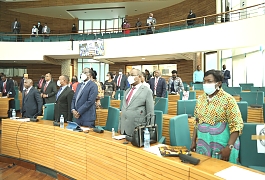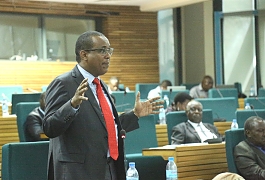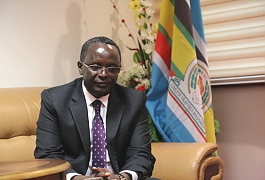EALA Elections Bill 2011 sails through Second Reading. Members of the East African Legislative Assembly (EALA) resumed deliberations yesterday with the 2nd reading of the EALA Elections Bill 2011 sailing through the floor of the House. The business in the House also included the debate and adoption of a report by the Committee of General Purpose and a number of priority questions put forth by Members to the Council of Ministers.
Debate on the Elections Bill 2011 followed the presentation of the report of the Committee on Legal Rules and Privileges on the Bill by a member of the Committee, Hon Valerie Nyirahabineza. The Committee termed the Bill as vital in providing uniform law to govern elections of future EALA Members.
The Bill stipulates the responsible entities in the election process and management of procedures, time-frames as well as the opening session of the Assembly. Parts of the Bill are characterized by general principles whose specific application and interpretation would be left to National Assemblies in the rules of procedures. The end result is a harmonized electoral process.
During debate, Members emphasized the need to have procedures of elections harmonized and to avoid a situation where the Partner States have prescribed different Rules of Procedures for electing Members, terming the lack of uniformity, a move bound to weaken the effectiveness of the Treaty. Hon Maj-Gen (Rtd) Mugisha Muntu and Dr.Hon F.L Masha further sought to have clause (4e) on continuity and institutional memory deleted and left to the wisdom of National Assemblies, a move supported by Members who rose to contribute to the motion.
“It is imperative that the procedure is harmonized to mitigate the shortcomings pointed out by the East African Court of Justice in its April 2007 court ruling in the case of EALA representatives from Kenya as well as in the Uganda case where the Court held that the rules were inconsistent with the Treaty”, Hon Nyirahabineza said.
The Chairperson of the Council, Hon. Hafsa Mossi hailed the Bill as important in EALA’s legislative development. She noted clauses 4, 6, 7 and 12 as taking cognizance of the relevant provisions of the Treaty for the establishment of the EAC. The Chairperson further supported Clause 3 on notification of timing of elections by National Assemblies, conduct of bye-elections and duration of the Assembly as legislative measures supporting current existing lacunae in the election of Members. Hon Mossi however supported the need to revisit clauses that may be deemed contrary to the Treaty. “These include clause 4(3) (e) and 4 (4) which seem to extend ambit of Article 50 (1) of the Treaty”, the Minister’s statement added. The Bill shall now be subject to the 3rd Reading.
Also debated and adopted was the Report of the Workshop on Policies and Strategies on Education, Research, Science and Technology in East Africa towards the enhancement of Innovations and Appropriate Technology. The Report summed up deliberations of the workshop held in Dodoma, Tanzania, on August 19-20, 2011 and organized by EALA’s General Purpose Committee. The two day workshop had sought to examine how the EAC is organized in terms of policies and strategies to effectively tap on research, science and appropriate technology to bring about development.
Presenting the findings, Hon Sebtuu Nassor, Chairperson of the Committee on General Purpose, noted that Science Technology and Innovation (STI) policies and legal frameworks in the region were at an infancy stage and this was coupled by lack of a critical mass of highly trained STI human resource and poor retention schemes of human capital. The Committee presented twelve key recommendations and the priority areas terming budgetary allocation as the top most priority for the region. The Chairperson also urged the EAC Partner States to provide adequate funding and budgetary allocations for sustainable research and development activities noting that the African Union’s decision to allocate a minimum of 1% of the Country’s GDP to research issues needed to be adhered to.
The report challenged the EAC to adequately contribute to the global agenda of STI and urged national parliaments and local councils of EAC Partner States to establish STI inter-parliamentary committees. “With specific reference to Parliaments, an EAC Inter Parliamentary Forum on STI could be formed to mirror the African Inter-Parliamentary Forum on Science, Technology and Innovation (AIPF-STI) already in process and currently chaired by EALA”, Hon Sebtuu added. The AIPF-STI was formed at a recent meeting organized by Economic Commission for Africa (UNECA) and the African Union in Addis Ababa, Ethiopia.
Further, the Committee urged the Council of Ministers to draw a roadmap for the establishment of STI regional networks.
“The Assembly through its relevant Committee should commit to sensitizing the National Parliaments to initiate an East African Inter-Parliamentary Forum on Science, Technology and Innovation and actively participate in the African Parliaments Forum’ the Chairperson said.
During debate, Members stood up in support of the Report and called for the inculcation of efficient systems and enhanced decision making at the EAC.
Parliament continues this afternoon.
-END-
NOTE TO EDITORS ABOUT EALA
The East African Legislative Assembly is the legislative organ of the East African Community. Its Membership consists of a total of 52, of whom 45 are elected Members (9 from each Partner State) and seven ex-officio members (the Ministers responsible for EAC Affairs from the Partner States, the Secretary General of the Community and the Counsel to the Community).
The East African Legislative Assembly has legislative functions as well as oversight of all East African Community matters. The enactment of legislation of the Community is effected by means of Bills passed by the Assembly and assented to by the Heads of State, and every Bill that has been duly passed and assented to become an Act of the Community and takes precedent over similar legislations in the Partner States.
EALA in June 2010 launched its Strategic Plan and Website at its 5th Meeting of the third Session held in Nairobi and Mombasa, Kenya respectively. The Strategic Plan is expected to go a long way to firmly entrench the EALA as the epitome of the Community’s democracy and unity. The EALA website www.eala.org provides the Assembly with the means to communicate actively with the citizens of East Africa and beyond and enhances public understanding of the legislature’s role and responsibilities.
For more information, contact
Bobi Odiko
Senior Public Relations Officer
East African Legislative Assembly
Tel: +255-27-2508240
Fax: +255-27-2503103
Cell: +255-787-870945
+254-733-718036
Email: BOdiko@eachq.org
Web: https://www.eala.org
NOTE TO EDITORS ABOUT EALA
The East African Legislative Assembly is the legislative organ of the East African Community. Its Membership consists of a total of 52, of whom 45 are elected Members (9 from each Partner State) and seven ex-officio members (the Ministers responsible for EAC Affairs from the Partner States, the Secretary General of the Community and the Counsel to the Community).
The East African Legislative Assembly has legislative functions as well as oversight of all East African Community matters. The enactment of legislation of the Community is effected by means of Bills passed by the Assembly and assented to by the Heads of State, and every Bill that has been duly passed and assented to become an Act of the Community and takes precedent over similar legislations in the Partner States.
EALA in June 2010 launched its Strategic Plan and Website at its 5th Meeting of the third Session held in Nairobi and Mombasa, Kenya respectively. The Strategic Plan is expected to go a long way to firmly entrench the EALA as the epitome of the Community’s democracy and unity. The EALA website www.eala.org provides the Assembly with the means to communicate actively with the citizens of East Africa and beyond and enhances public understanding of the legislature’s role and responsibilities.
For more information, contact
Bobi Odiko
Senior Public Relations Officer
East African Legislative Assembly
Tel: +255-27-2508240
Fax: +255-27-2503103
Cell: +255-787-870945
+254-733-718036
Email: BOdiko@eachq.org
Web: https://www.eala.org



